Faculty Profile
Chelsea Skalak
Assistant Professor of English (2015)Contact Information
East College
717-245-1064
Bio
Professor Skalak is a teacher and scholar of medieval British literature. Her research interests include medieval gender and sexuality, legal studies, female authorship, and digital humanities. She has published articles on medieval romance, marital rape in The Canterbury Tales, and teaching the global Middle Ages. Recent courses include Chaucer's Women, Medieval Women Writers, King Arthur from Medieval to Modern, and Mapping the Global Middle Ages. She is a contributing faculty member in Medieval and Early Modern Studies and Women's, Gender, and Sexuality Studies.
Education
- B.A., Northwestern University, 2008
- M.A., University of Virginia, 2011
- Ph.D., 2015
2025-2026 Academic Year
Fall 2025
MEMS 200 Mapping the Global Middle Ages
Cross-listed with ENGL 321-02.
ENGL 321 Mapping the Global Middle Ages
Cross-listed with MEMS 200-02. From England to Jerusalem, Morocco to Rome, Ireland to India, the medieval traveler encountered and came to terms with varieties of cultures, religions, and races. The maps and written records of these travelers, both imagined and real, inspired the imaginations of their contemporaries and helped shape larger cultural narratives about nationalism, religion, and personal identity. This course will examine medieval maps and travel narratives from 1000-1500 CE in order to better understand the diverse cultural work performed by reports of encounters with other cultures. How did these travel narratives strengthen or question faith, critique or support nationalism, and establish or sustain gendered and racial identities?
ENGL 403 Meth/Models of Lit Schol
This course prepares students to write a senior thesis by exploring key questions and methods in literary scholarship. Students in this seminar will pursue intensive reading, writing and discussion designed to: (1) strengthen their grasp of the history and current configuration of literary studies and related fields; (2) help them frame and begin to pursue the questions that will motivate their senior theses; and (3) hone their critical self-awareness as readers and writers.
Spring 2026
ENGL 101 The Legend of King Arthur
The legend of King Arthur has captured imaginations for hundreds of years, inspiring adaptations even into the present day. Yet when the legend originated a millennium ago, it was already considered a tale of a bygone age, the dream of a romantic past. This class will study the medieval origins of the King Arthur story and then trace that legend through time to the present day, including the films King Arthur and Monty Python and the Holy Grail. As we read, we will consider how each text responds to both its historical context and its own imagined past.
WGSS 301 Chaucer's Women
Cross-listed with ENGL 311-01. Patient Griselda, sensual Alisoun, long-suffering Constance, the irrepressible Wife of Bath - in The Canterbury Tales, Chaucer provides a wide range of women who alternately uphold and challenge the medieval boundaries of femininity. In this class we will explore medieval conceptions of gender, sexuality, and authority by way of Chaucer's most memorable women, read alongside confessional manuals, scientific treatises, and religious tracts that provide insight into how medieval scholars conceptualized the differences between men and women.
ENGL 311 Chaucer's Women
Cross-listed with WGSS 301-02. Patient Griselda, sensual Alisoun, long-suffering Constance, the irrepressible Wife of Bath - in The Canterbury Tales, Chaucer provides a wide range of women who alternately uphold and challenge the medieval boundaries of femininity. In this class we will explore medieval conceptions of gender, sexuality, and authority by way of Chaucer's most memorable women, read alongside confessional manuals, scientific treatises, and religious tracts that provide insight into how medieval scholars conceptualized the differences between men and women.
ENGL 404 Senior Thesis Workshop
A workshop requiring students to share discoveries and problems as they produce a lengthy manuscript based on a topic of their own choosing, subject to the approval of the instructor.Prerequisites: 403.
